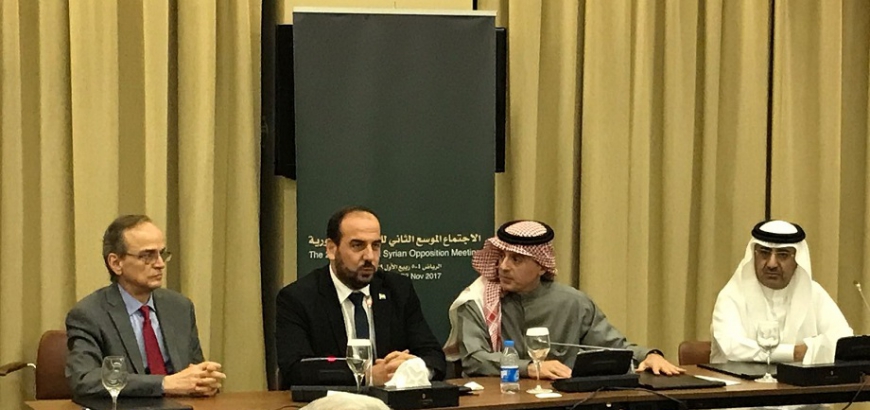The views and analyses explaining the real motives and reasons behind the resignation of the General Coordinator for the High Negotiations Committee Riyad Hijab and seven other members have varied. While Hijab attributed his decision to resign to “an attempt to reduce the expectations of the revolution,” another resigned member, Suheil al-Atasi, said that the resignation was “an expression of the members’ rejection” of international pressure to force the opposition to accept a role for President Bashar al-Assad.
A member of the General Secretariat of the Damascus Declaration, Samir Nashar, pointed to what he described as “collusive practices within the [Syrian National] Coalition with the [National] Coordination Committee and Cairo Platform, with support from Moscow, to overthrow the High [Negotiations] Committee,” which led to the resignation decision.
Commenting on this, a member of the political bureau in the Coalition and former member in the HNC, Abdul Hakim Bashar, did not deny the existence of this collusion, while he also did not confirm it. On the real reasons for the resignations, Bashar, who also heads the Kurdistan Democratic Party of Syria, said: “We, as a high committee, called for a broad meeting of the committee to strengthen its role and to add national figures or other parties who were not represented. We asked our brothers in the Kingdom of Saudi Arabia to help us in this, considering that it is the host country for the committee, and it responded kindly to our request.”
He added: “We formed a council from the committee to prepare some documents, and the trend was toward the committee coordinating with the Foreign Ministry in the kingdom to prepare this conference. But what happened was that the High Committee was completely ignored.”
He continued: “On the contrary, an invitation was made to other bodies such as the Cairo and Moscow platforms to the conference in an official capacity, and the invitation was not made to High Committee, knowing that they were in charge of the project.”
Regarding the participation of the Moscow platform in the Riyadh II conference, and the controversy sparked by the announcement of its non-participation, Bashar said, “So far the position of the Moscow platform is ambiguous, but I believe that they will continue for a period in this position, which is linked to what will be put forward in the coming talks and in the Sochi conference.”
The platform previously announced it would refuse to discuss the fate of Assad in Syria’s future. In response, Bashar said, “It will also not now accept talk of Assad’s departure, and will not accept the demand for the departure of the sectarian militias. Likewise, it will try to push toward the new High Committee participating in the Sochi conference.”
He said that if the Moscow platform achieves its aims it will continue, and if it does not achieve what it wants, it will withdraw immediately, or will play the spoiler role in the HNC.
On another side, Bashar described the ratio of representation of the opposition spectrum in the HNC in its new formation as “unfair” and said: “There should have been broader representation for armed groups and real revolution and opposition forces, and for the Kurds.”
Regarding the new HNC, which is headed by Nassar al-Hariri, dealing with the issue of Assad remaining in power, Bashar said: “I think the new High Committee composition alone is enough to give an answer, as it has members who consider Assad’s departure a red line and discussion of Iranian intervention a red line, and so it is.” He continued: “So what will be negotiated?”
From another side, Bashar stressed the “clear and principled” position of the Syrian National Coalition, saying that the Coalition will not concede the demand of Assad’s departure at the beginning of the transitional stage, and likewise the demand for all Iran’s sectarian militias to depart, to fight terrorism, restructure the army and security forces, and ensure the rights of all communities of the Syrian people.
Regarding his expectations for the coming stage of Geneva negotiations, he said: “I do not think that Assad’s fate will be discussed seriously, but may come up in a way that avoids going into depth.”
In his explanation of Russia’s indication that all parties needed to make concessions, he said: “The most that the regime can accept in current conditions created by various factors and Russian pressure is accepting a joint government between the regime and those of the opposition it accepts.”
Bashar concluded saying: “However this solution is not a solution but a greater complication of the issue, and will be an incentive for Syrians to mobilize their revolution more than ever, which has not and will not be extinguished until its aims are achieved.”
This article was translated and edited by The Syrian Observer. Responsibility for the information and views set out in this article lies entirely with the author.


